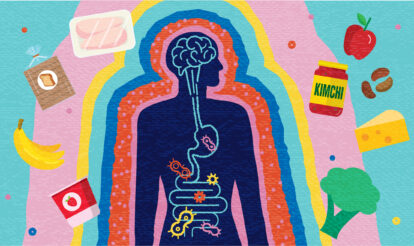
How to Choose the Best Probiotics for You
How to Choose the Best Probiotics for You

Probiotics might be some of the most commonly used dietary supplements, but did you know that they’re not all the same? Here’s why: certain species and strains of probiotics work better for some health conditions than others, and the active ingredients vary depending on what condition they are being used for. Always do your homework so you can choose the best probiotics for you, especially if you have Irritable Bowel Syndrome (IBS) or other digestive troubles.
Here’s what to look for in a probiotic, the benefits, and which ones might be more effective for relieving digestive symptoms.
What Are Probiotics?
The word probiotic comes from Greek and means “for life.”¹ Probiotics are live and active microorganisms that can be great for your health when taken in recommended amounts. They contain many of the same friendly bacteria and yeasts that already live in your gastrointestinal (GI) tract, so taking probiotics can repopulate your gut with additional beneficial microbes, supporting a healthy microbiome – the gut’s vast ecosystem of trillions of bacteria, yeasts, viruses, protozoa, and other microbes .
Each probiotic brings something different to the microbiome, but the most studied probiotics for digestive health belong to the Lactobacillus, Bifidobacterium, or Saccharomyces genera. ²
Lactobacillus and Bifidobacterium are two of the first bacteria to grow in your GI tract after you’re born. They enter your body during your delivery, either as you pass through the birth canal, or from skin contact if you’re delivered by caesarean section. Saccharomyces are yeasts that come from your environment and certain foods, such as grapes and yogurt.
In the first few years of your life more of these (and other) bacteria and yeasts enter your gut from foods, your environment, other people, and animals, to create your unique microbiome.
Why Are There So Many Different Probiotics?
When scientists refer to specific types of probiotics, they identify them according to their genus (a way of grouping things with similar traits, qualities or features), species, and strain. For bacterial probiotics, as an example:
| Genus | Species | Strain |
| Lactobacillus | rhamnosus | GG |
| Bidifobacterium | lactis | UABla-12 |
There are seven core genera of bacteria and yeast used in probiotics: ⁴
- Lactobacillus
- Bifidobacterium
- Saccharomyces
- Streptococcus
- Enterococcus
- Escherichia
- Bacillus
Within each genus are even more species and strains, and the effects of probiotics are species and strain-specific.³ Simply put, this means each genus, species, and strain works differently in your body, and sometimes, they work better in certain combinations.
For example, two similar-looking probiotic supplements that contain Lactobacillus, may have completely different strains, and very different health outcomes.
Probiotics work best when paired with prebiotic fibre which are a source of food or fertiliser for your probiotics – without adequate prebiotic fibre to feed and nourish them, your probiotics won’t survive and flourish.
You can get prebiotic fibre from a diet including a wide variety of plant foods such as vegetables, fruits, legumes, whole grains, nuts, and seeds. Some probiotic manufacturers also add prebiotic fibre to their products – these probiotic-prebiotic supplements are called synbiotics.
How Probiotics Work
Taking probiotics can help to support your immune and gut health in various ways.
Both Lactobacillus and Bifidobacterium convert carbohydrates into lactic acid which maintains an acidic environment in your gut. You need this to stop harmful bacteria from growing and to protect you from infections. Research shows these bacteria, as well as Saccharomyces yeasts, have other great benefits; they can protect and strengthen your gut lining, reduce inflammation, and help regulate the balance of other healthy bacteria and microbes in your gut.¹
A healthy balance of bacteria and microbes is critical, and is the focus of much of the research on the microbiome. Many studies have made the link between an imbalance in the microbiome (known as dysbiosis) to an increased risk of health conditions such as IBS.⁶ When Dysbiosis happens your microbiome becomes less diverse as beneficial bacteria and microbes decline, and unfriendly microbes can take over.
What about probiotics from food?
You might be wondering if it’s better to get probiotics from what you eat, such as yoghurt, kefir, or sauerkraut rather than take a supplement. However, interestingly, while cultured foods have health benefits, the live microorganism count isn’t standardised or anywhere near as high as that in a probiotic supplement.
A good probiotic supplement is tested at specific doses to show they are safe and have a health benefit at the provided amount. To provide you with any benefits, the microbes they contain must still be alive after passing into your GI tract, and should be listed on a product label as colony-forming units (CFUs). Typical probiotic dosages vary based on the product but range from between three and 50 billion CFUs per day for adults, and dosing recommendations are based on the particular strains and research. Importantly, a higher CFU count doesn’t necessarily make a probiotic more effective.
Benefits for Digestive Health
A significant benefit of probiotics is that as they support your microbiome, they also improve the structure and function of your gut. When your GI tract works better, you digest food better and feel better. So, whether you experience occasional digestive complaints such as constipation, or you struggle with more serious and ongoing symptoms related to IBS, you could benefit from the support of probiotics.
How do probiotics improve the structure and function of your gut?
1. They produce short-chain fatty acids
Probiotics help boost the beneficial bacteria in your gut that break down and ferment the fibre your small intestine can’t digest. During this fermentation, your friendly bacteria produce essential compounds called short-chain fatty acids, which feed the cells that line your colon, helping to maintain health and bacterial balance in your gut.⁵,⁶
By supporting a healthy gut microbiome, probiotics also help your digestive tract work more effectively. The healthy bacteria and the short-chain fatty acids they produce, help regulate the nerves and muscles in your digestive tract. This allows your intestines to sense when food arrives, so it can be digested, and moved along and out of your body as waste.
Your intestines and brain chat back and forth 24/7 through a system called the gut-brain axis. You’ll have experienced the effects of your gut-brain axis when anxiety or stress causes you to have a “nervous” or upset stomach.
There’s evidence that your microbiome and the short-chain fatty acids produced play a role in how well your gut-brain axis works⁵ , and researchers believe the gut-brain axis is disrupted in people with IBS. This results in food waste moving through the intestines too quickly, causing diarrhea, or too slowly, causing constipation. Problems in communication between your gut and brain can also cause intestinal pain from gas or digestion more intensely. ⁶
2. They reduce the risk of leaky gut
A strong and protected small intestine lining is vital to prevent intestinal permeability, commonly called leaky gut. This is when undigested food particles, allergens, and toxins can leak through your intestinal barrier into your bloodstream. Leaky gut can also allow harmful pathogens to enter your gut. Either situation can trigger an immune reaction or severe inflammation which can lead to digestive symptoms such as pain or diarrhea.⁶,⁷
Symptoms of intestinal permeability can vary, but it seems to be common among people with IBS, and it might contribute to more severe IBS symptoms. Those with intestinal barrier dysfunction more frequently report more abdominal pain, diarrhea, anxiety, depression, and decreased quality of life.⁸
Can probiotics heal your gut?
Probiotics don’t directly heal your gut, but can work by changing and improving your microbiome, which in turn produces good amounts of short-chain fatty acids and other compounds that support a healthy digestive tract. A healthy microbiome can also fight off pathogenic bacteria, and reduce the production of inflammatory compounds, both of which can affect the health and structure of your gut.
These are some of the probiotic species that have been tested and show various benefits for gut health, including reducing diarrhea, constipation, and strengthening the gut lining:¹⁰
- Lactobacillus species (L. rhamnosus, L. salivarius, L. paracasei, L. plantarum, L. acidophilus)
- Bifidobacterium species (B. infantis, B. lactis, B. bifidum)
- Saccharomyces species (S. boulardii, S. cerevisiae)
Changes to your microbiome and your gut health may take several weeks or months, but taking the right probiotics, supported by prebiotics, is an important first step toward a healthier digestive tract.
Probiotics vs. a Medical Food
Probiotics support better digestive health in non-specific ways. If you have a more serious digestive condition such as IBS, you can ask your healthcare provider about using a medical food instead of a prebiotic supplement. A medical food contains specific species and strains of probiotics that are clinically tested in people and shown to benefit a particular disease or condition.
Unlike regular probiotics for general digestive health, a medical food for IBS is specially formulated and intended for the dietary management of IBS. It offers distinctive nutritional needs that can’t be met through diet changes alone.
People with IBS live with ongoing abdominal pain, gas, bloating, constipation, and diarrhea. These species and strains of probiotics in certain medical foods for IBS have been clinically tested and shown to have these benefits:
- plantarum reduced abdominal pain and bloating in a four-week study.¹¹ A 12-week study showed it reduced the severity of abdominal pain by 67%, diarrhea by 70%, and constipation by 79%. It’s also worth noting that L. plantarum may help improve the quality of life in those with IBS. People who took this probiotic reported a 110% improvement in mental well-being after 12 weeks.¹²
- Adults diagnosed with functional constipation reported more regular bowel movements after supplementing with the probiotic lactis for 28 days, compared to those who took a placebo.¹³
- After 12 weeks, adults with moderate to severe IBS-related pain who took the probiotic acidophilus reported significantly less abdominal pain than those who took a placebo. 14
A medical food also provides microbiome support like general probiotics, but because it contains specific clinically tested species and strains, it might also provide more effective symptom relief.
Do Your Research
There’s much to consider when choosing the best probiotic to help improve your digestive health. Ask your healthcare provider for specific recommendations if you have certain health concerns. Here are some questions you can ask:
- What species and strains are best for my health needs? Many probiotics provide general health benefits for your immune system or gut health, but if you’re trying a probiotic to help with a particular health condition, you’ll want to choose the right genus, species, and strain.
- What is the recommended serving size? Check the product label to see if you should take the probiotic once a day or more often. Also, look for the number of live bacteria and yeast listed on the label as CFUs. Good probiotic brands can range from one to 50 billion CFUs per dose. But remember, a larger number of CFUs isn’t necessarily more effective.
- Is the probiotic free from common allergens? If you have allergies or sensitivities to soy, wheat, dairy, or other ingredients, be sure to check the label. Manufacturers will state if their probiotics are free from common allergens.
- Do you need a low FODMAP prebiotic? If you want to try a synbiotic (probiotic + prebiotic), be aware that some contain a high FODMAP prebiotic such as inulin. In contrast, others contain a low FODMAP prebiotic such as partially hydrolyzed guar gum (PHGG). FODMAPS are carbohydrates that are highly fermentable in your large intestine. If you have IBS, you may find eating certain high FODMAP foods or ingredients can worsen IBS symptoms like gas, bloating, or diarrhea. With IBS, you might want to try a probiotic that’s paired with a low FODMAP prebiotic until your symptoms improve.
- Does your probiotic require refrigeration? Probiotics are live microorganisms and must be stored properly. As long as they are stored as directed, a refrigerated probiotic isn’t any more effective than a shelf-stable one. The main difference is convenience. If you travel frequently or take your probiotic away from home, choosing a shelf-stable one can be more convenient.
Keep in mind any probiotic is only effective if you take it as directed. To ensure you’ll use it regularly, choose one that’s convenient for you and your lifestyle and be sure to consistently take it in order to see benefits over time.
REFERENCES
1. Azad MAK, Sarker M, Li T, Yin J. Probiotic Species in the Modulation of Gut Microbiota: An Overview. Biomed Res Int. 2018;2018:9478630. Published 2018 May 8. doi:10.1155/2018/9478630
https://www.ncbi.nlm.nih.gov/pmc/articles/PMC4223251/
2. Wilkins T, Sequoia J. Probiotics for Gastrointestinal Conditions: A Summary of the Evidence. American Family Physician. 2017 Aug 1;96(3):170-8. https://www.aafp.org/afp/2017/0801/p170.html
3. Fijan S. Microorganisms with claimed probiotic properties: an overview of recent literature. Int J Environ Res Public Health. 2014;11(5):4745-4767. Published 2014 May 5. doi:10.3390/ijerph110504745 https://www.ncbi.nlm.nih.gov/pmc/articles/PMC4053917/
4. National Institutes of Health Office of Dietary Supplements. Probiotics.
https://ods.od.nih.gov/factsheets/Probiotics-HealthProfessional/ .
Updated June 3, 2020. Accessed October 27, 2021
5. Silva YP, Bernardi A, Frozza RL. The Role of Short-Chain Fatty Acids From Gut Microbiota in Gut-Brain Communication. Front Endocrinol (Lausanne). 2020;11:25. Published 2020 Jan 31. doi:10.3389/fendo.2020.00025. https://internal-journal.frontiersin.org/articles/10.3389/fendo.2020.00025/full
6. Hills RD Jr, Pontefract BA, Mishcon HR, Black CA, Sutton SC, Theberge CR. Gut Microbiome: Profound Implications for Diet and Disease. Nutrients. 2019;11(7):1613. Published 2019 Jul 16. doi:10.3390/nu11071613 https://www.ncbi.nlm.nih.gov/pmc/articles/PMC6682904/
7. Chong, P. P. et al. The microbiome and irritable bowel syndrome – A review on the pathophysiology, current research and future therapy. Frontiers in Microbiology vol. 10 (2019).https://www.frontiersin.org/articles/10.3389/fmicb.2019.01136/full
8. Hanning N, Edwinson AL, Ceuleers H, et al. Intestinal barrier dysfunction in irritable bowel syndrome: a systematic review. Therap Adv Gastroenterol. 2021;14:1756284821993586. Published 2021 Feb 24. doi:10.1177/1756284821993586
https://www.ncbi.nlm.nih.gov/pmc/articles/PMC7925957/
9. Camilleri M. Leaky gut: mechanisms, measurement and clinical implications in humans. Gut. 2019;68(8):1516-1526. doi:10.1136/gutjnl-2019-318427 https://www.ncbi.nlm.nih.gov/pmc/articles/PMC6790068/
10. Rao RK, Samak G. Protection and Restitution of Gut Barrier by Probiotics: Nutritional and Clinical Implications. Curr Nutr Food Sci. 2013;9(2):99-107. doi:10.2174/1573401311309020004 https://www.ncbi.nlm.nih.gov/pmc/articles/PMC3864899/
11. Ducrotté P, Sawant P, Jayanthi V. Clinical trial: Lactobacillus plantarum 299v (DSM 9843) improves symptoms of irritable bowel syndrome. World J Gastroenterol. 2012;18(30):4012-4018. doi:10.3748/wjg.v18.i30.4012 https://www.ncbi.nlm.nih.gov/pmc/articles/PMC3419998/
12. Krammer H, Storr M, Madisch A, Riffel J. Treatment of IBS with Lactobacillus plantarum 299v:
therapeutic success increases with length of treatment-real-life data of a non-interventional study in Germany. Z Gastroenterol. 2021 Feb 8;59(2):125–34.
13. Ibarra A, Latreille-Barbier M, Donazzolo Y, Pelletier X, Ouwehand AC. Effects of 28-day Bifidobacterium animalis subsp. lactis HN019 supplementation on colonic transit time and gastrointestinal symptoms in adults with functional constipation: a double-blind, randomized, placebo-controlled, and dose-ranging trial. Gut Microbes. 2018 May 4;9(3):236-51.
14. Lyra A, Hillilä M, Huttunen T, Männikkö S, Taalikka M, Tennilä J, Tarpila A, Lahtinen S, Ouwehand AC, Veijola L. Irritable bowel syndrome symptom severity improves equally with probiotic and placebo. World journal of gastroenterology. 2016 Dec 28;22(48):10631.




